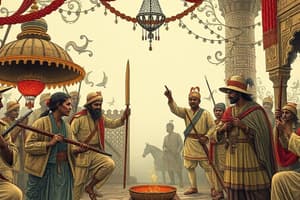Podcast
Questions and Answers
Which action by the British East India Company most directly fueled the fear among some Indians that their religions were being undermined in the 19th century?
Which action by the British East India Company most directly fueled the fear among some Indians that their religions were being undermined in the 19th century?
- Enforcing strict trade tariffs that harmed local artisans and merchants.
- Implementing land revenue systems that displaced many peasant farmers.
- Promoting English-language education and allowing Christian missionaries to own property. (correct)
- Demanding that Indian soldiers serve overseas, violating religious customs.
How did the law passed in 1850, which facilitated the conversion to Christianity, impact inheritance rights in India?
How did the law passed in 1850, which facilitated the conversion to Christianity, impact inheritance rights in India?
- It allowed Christian missionaries to inherit land from non-Christian families.
- It prohibited individuals who converted to Christianity from inheriting ancestral property.
- It mandated that all ancestral property be divided equally among Christian and non-Christian heirs.
- It enabled Indians who converted to Christianity to inherit the property of their ancestors. (correct)
Vishnubhatt Godse's writings suggest that the sepoys he encountered believed which of the following regarding the British intentions?
Vishnubhatt Godse's writings suggest that the sepoys he encountered believed which of the following regarding the British intentions?
- The British were determined to eradicate both Hindu and Muslim religions through a set of imposed rules. (correct)
- The British sought to integrate Indian culture with European traditions to foster a more unified society.
- The British planned to improve agricultural practices to enhance crop yields and reduce famine.
- The British aimed to modernize Indian society by introducing new technologies and infrastructure.
The rumors circulating among the sepoys, as mentioned in Majha Pravas, reveal which key element contributing to the unrest?
The rumors circulating among the sepoys, as mentioned in Majha Pravas, reveal which key element contributing to the unrest?
What can be inferred about the collective response of Indian kings and princes to the 'eighty-four rules' announced by the British?
What can be inferred about the collective response of Indian kings and princes to the 'eighty-four rules' announced by the British?
Based on the information presented, which statement best encapsulates the dual impact of British reforms on Indian society?
Based on the information presented, which statement best encapsulates the dual impact of British reforms on Indian society?
How does Vishnubhatt Godse's account contribute to understanding the socio-political climate of the time?
How does Vishnubhatt Godse's account contribute to understanding the socio-political climate of the time?
Considering the historical context, what was a significant long-term consequence of the British policies and the reactions they provoked?
Considering the historical context, what was a significant long-term consequence of the British policies and the reactions they provoked?
What does the image of sepoys exchanging news and rumors in the bazaars of North India (Figure 2) suggest about the spread of information during that period?
What does the image of sepoys exchanging news and rumors in the bazaars of North India (Figure 2) suggest about the spread of information during that period?
Based on the provided sources, what was the primary concern driving the 'war of religion' planned by the Indian kings and princes?
Based on the provided sources, what was the primary concern driving the 'war of religion' planned by the Indian kings and princes?
Flashcards
British Social Reforms in India
British Social Reforms in India
The British belief that Indian society needed transformation through legal and educational changes.
Sati
Sati
The act of a widow immolating herself on her husband's funeral pyre, which the British outlawed.
English-Language Education
English-Language Education
The promotion of education using the English language in India.
Missionary Activities Post-1830
Missionary Activities Post-1830
Signup and view all the flashcards
1850 Conversion Law
1850 Conversion Law
Signup and view all the flashcards
Indian Reactions to British Rule
Indian Reactions to British Rule
Signup and view all the flashcards
Majha Pravas
Majha Pravas
Signup and view all the flashcards
Religious Wipeout Rumors
Religious Wipeout Rumors
Signup and view all the flashcards
Eighty-Four Rules
Eighty-Four Rules
Signup and view all the flashcards
Bazaars as Information Hubs
Bazaars as Information Hubs
Signup and view all the flashcards
Study Notes
- Sepoys exchange news and rumors in the bazaars of north India.
Responses to reforms
- The British believed that Indian society needed reform.
- Laws were enacted to stop the practice of sati and encourage the remarriage of widows.
- English-language education was actively promoted.
- After 1830, the Company allowed Christian missionaries to function freely and own land.
- In 1850, a new law eased conversion to Christianity and allowed Christian converts to inherit ancestral property.
- Many Indians felt the British were destroying their religion, customs, and way of life.
- Some Indians wanted to change existing social practices.
Through the Eyes of the People
- To understand people's thoughts about British rule during that time, it's helpful to study primary sources.
The list of eighty-four rules
- Excerpts from "Majha Pravaas," a book written by Vishnubhatt, a Brahmin from Maharashtra detail people's view on British rule.
- Vishnubhatt and his uncle, on their way to a yajna in Mathura, encountered sepoys who warned them against continuing their journey, citing an impending upheaval.
- The sepoys warned that the English intended to eliminate Hindu and Muslim religions with a list of eighty-four rules.
- The English announced the rules in Calcutta to kings and princes.
- The kings rejected the rules, warning of dire consequences and massive upheaval if implemented and returned to their capitals angered.
- The important figures started making plans, a date was set for a war of religion, and the secret plan circulated from the cantonment in Meerut to other cantonments via letters.
Studying That Suits You
Use AI to generate personalized quizzes and flashcards to suit your learning preferences.





